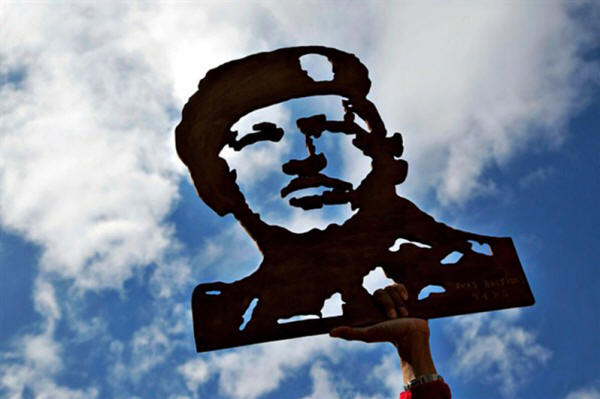|
from WorldPoliticsReview Website
raised by supporters of current President Nicolas Maduro during a march to the National Assembly for the swearing-in of the new Constituent Assembly, Caracas, Aug. 4, 2017 (AP photo by Wil Riera).
Venezuela, meanwhile,
will replace one controversial constitution - which was adopted in
1999 under the late President
Hugo Chavez, a revolutionary to
his supporters, and an illiberal authoritarian to his critics - with
another that could be drafted in a matter of months and further
consolidate power for Chavez's increasingly autocratic successor,
President Nicolas Maduro.
But if they show
anything, it is that a vast political disparity still exists in
South America, and it isn't going away anytime soon.
Five hundred and forty-five delegates were virtually handpicked by Maduro's regime to rewrite Venezuela's constitution. Critics warn that the new charter will be drafted to give Maduro power over all three branches of government.
In the meantime, the
assembly declared itself superior to the opposition-controlled
parliament and seems set to legislate in its place.
The elections were
supposed to quell international criticisms, but only made them
louder, as a reported 15 people died protesting outside mostly empty
voting centers.
In June, Venezuela's minister of foreign affairs, Delcy Rodriguez, told Peruvian President Pedro Pablo Kuczynski to keep his "funeral hands" off of the country, after Kuczynski suggested that leaders in the region discuss human rights violations in Venezuela.
One of the most bizarre reprisals, though, occurred just days before the Constituent Assembly elections, when Maduro published a video of himself driving around the capital, Caracas, pointing out how normal it looked despite a national strike organized by the political opposition.
For some reason, he used part of that video to attack Chilean President Michelle Bachelet for a comparatively bland comment she made urging Venezuela to resolve its,
In response, Maduro
claimed Bachelet is a lying puppet of the United States and
that Chile is always unjustifiably involving itself in the affairs
of his country.
Even more, he has nothing to gain by inviting comparisons to a country that has been South America's shining star for the past decade.
Bachelet's moderate leftist policiescould have served as a model for Maduroto follow in achieving a more realisticand equitable version ofChavez's socialist program.
Chile boasts the second-highest GDP in South America thanks to a diverse, competitive economy that has generally been unmarred by corruption or political scandal.
Venezuela, meanwhile, leads the world with a staggering 740 percent inflation rate, due in part to the country's heavy dependence on oil exports that have tanked.
Profits from the
state-run oil industry overlap with international
drug-trafficking operations organized by members of the regime,
reportedly as high up as Vice President
Tareck El Aissami.
Instead, Maduro's remarks seem to reveal how out of touch he is with South American politics today.
Maduro is right about Chile's current constitution, which was drafted by Pinochet in 1980.
But the Bachelet
administration is currently working to write a new one. The steps it
has taken so far show the democratic standards by which many South
American governments currently operate - and that Maduro doesn't
even seem to recognize.
Beginning with
small town halls where citizens could discuss what they value in a
constitution, and followed by similar meetings on the district and
regional levels, it would end with a large, comprehensive document
of suggestions for lawmakers.
Many lawmakers, for example, want to remove the president's ability to control what gets debated in Congress, and for how long.
They also want to
untangle political gridlock caused by a requirement that all bills
pass with 60 percent support from both houses of Congress - the
Chamber of Deputies and the Senate - a percentage that many other
countries reserve for major constitutional reform.
But many Chilean officials believe it's time to distance the country altogether from the legacy of Pinochet, whose dictatorship was responsible for thousands of disappearances and deaths.
In 1980, Pinochet
picked a group of loyalist lawmakers to draft the constitution
behind closed doors - not unlike what Maduro is attempting today.
And yet he continues to violate those same freedoms himself every day.
By mocking Bachelet
and Chile's 'truly' democratic process of drafting a new
constitution, Maduro showed how far Venezuela has drifted under his
watch and how out of touch his rule is with democratic trends in the
region...
|


